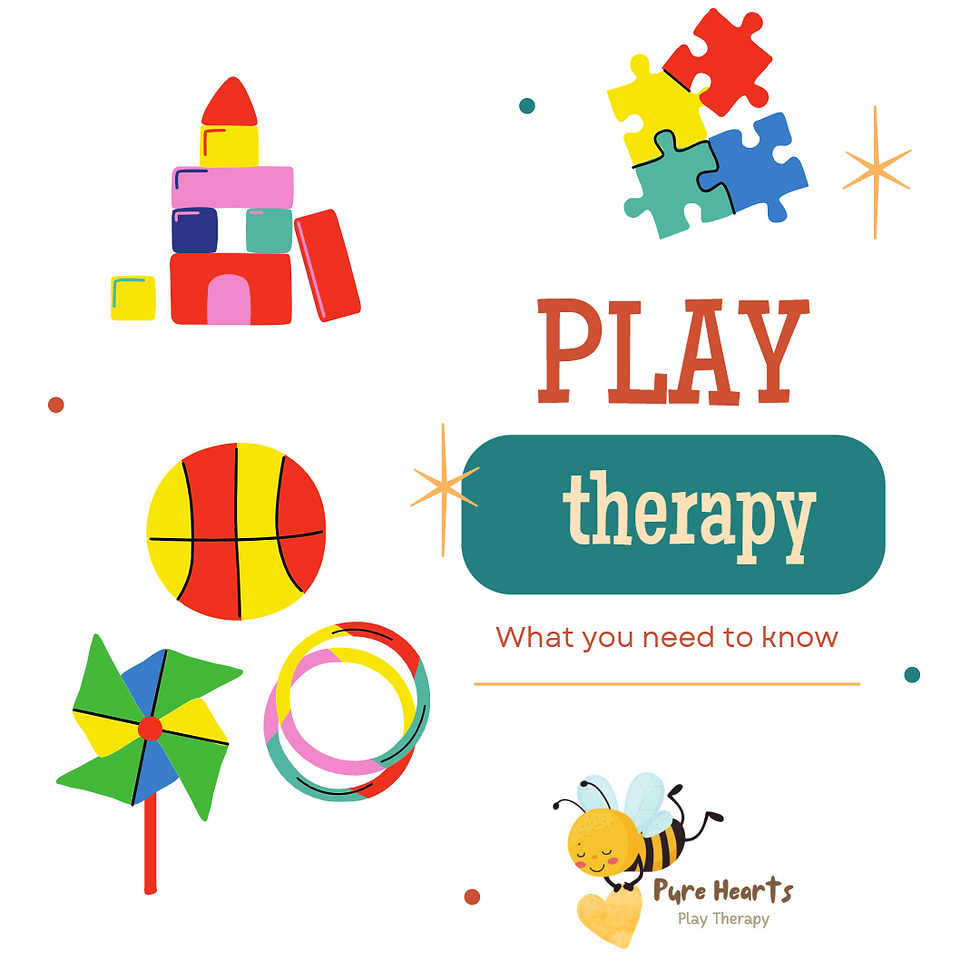Play Therapy! Here's what you need to know...
- Joanél Kruger
- Feb 4, 2023
- 4 min read

I am so excited to note that Play Therapy, or what some academics know as Play Based Intervention, is a growing field in South Africa! Play Therapy has so many amazing qualities and contributions to share to our communities but first we need to grow awareness about what exactly is this new, growing field?
What is Play Therapy?
Play therapy is a type of psychotherapy that uses play and imaginative activities as the main means of communication and expression for children. It aims to help children process their emotions, behaviors, and experiences in a safe and non-threatening environment, and to improve their psychological well-being. Play therapy is typically conducted by trained therapists who have expertise in child development and psychology.
Play-based intervention is a therapeutic approach that uses play and other forms of child-led activity as a means of promoting positive change in children. It is based on the premise that play is a natural and essential part of children's development, and that it provides an ideal context for learning and growth. Play-based interventions can take many forms, including imaginative play, creative arts, movement and physical play, and games. They can be used to address a wide range of emotional, behavioral, and developmental concerns, including anxiety, depression, trauma, and behavioral problems. The goals of play therapy can vary, but may include: improving children's emotional regulation, helping them develop social skills, resolving conflicts, reducing stress and anxiety, and improving overall well-being. Play-based interventions are typically led by trained therapists or professionals who understand the developmental needs and perspectives of children. They provide a supportive and safe environment for children to engage in play and exploration, and to process their experiences and emotions. In South Africa, most Play Therapists operate in the field as trained counsellors. Overall, play-based interventions offer a positive, child-centered approach to therapy that can be effective in promoting positive change and improving children's mental health and well-being.
The path to become a Play Therapist may include different fields of study such as education, psychology, social work and medical sciences. After studying a particular Degree relating to childhood development, a student must educate themselves directly in the field of Play Based Intervention which can be studied as a counsellors course following a degree. These courses include multiple counselling fields and practical hours to be registered with a supporting ethical body such as the ASCHP or the HPCSA (depending on where the counsellor did their initial degree).
What does a Play Therapist Do?
Play therapists in South Africa use different techniques of therapy and their overall approach may vary depending on the specific needs of the child and the training and approach of the therapist. However, some common approaches used by play therapists in South Africa include:
Child-centered play therapy:
This is a non-directive approach that allows the child to lead the play and guide the therapy process. The therapist acts as a facilitator, providing a supportive and accepting environment for the child to explore and process their feelings and experiences.
Filial therapy:
This is a parent-child play therapy where the parent is trained to be the primary therapist for their child. The parent and child engage in play activities together, with the parent taking on a supportive role.
Cognitive-behavioral play therapy:
This approach combines play therapy with cognitive-behavioral therapy to help children understand and change negative thought patterns and behaviors.
Trauma-focused play therapy:
This approach is specifically designed to help children who have experienced trauma, such as abuse or violence. It uses play to help children process and make sense of their traumatic experiences.
Sandplay therapy:
This approach uses sand and miniature objects to create a symbolic play environment. The therapist and child collaborate to create a sand tray that reflects the child's thoughts, feelings, and experiences.
These are some of the common approaches used by play therapists in South Africa. The specific approach used will depend on the individual needs of the child, the goals of the therapy, and the training and experience of the therapist. Some therapists or counsellors also combine different approaches and techniques to have the ultimate impact of the therapeutic approach.
What does Play Therapy contribute to South Africa?
The impact of play therapy in South Africa has been significant in helping children cope with the challenges they face. South Africa has a high level of poverty, violence, and trauma, which can negatively affect children's mental health and development. Play therapy has been found to be an effective intervention for addressing a range of emotional, behavioral, and psychological problems in children, including anxiety, depression, and post-traumatic stress disorder (PTSD). Play therapy has been used in schools, clinics, and community organizations to support children who have been exposed to trauma, abuse, and other forms of violence. It has been shown to improve children's emotional regulation, social skills, and overall well-being. It has also been used as a prevention strategy to help children build resilience and coping skills in the face of adversity. However, despite its potential benefits, play therapy is not widely available in South Africa, and many children who could benefit from it do not have access to it. The shortage of trained play therapists, limited funding for mental health services, and stigma associated with seeking help for mental health problems are among the challenges that need to be addressed to make play therapy more widely available to children in South Africa.
There are so many reasons to promote play therapy in South Africa but I guess, as a play therapist myself, my favorite reason remains being there for our kids!
South Africa has so many children that need support, love and kindness. This field is a platform to distribute greatness to our young minds and create a better tomorrow.








Comments